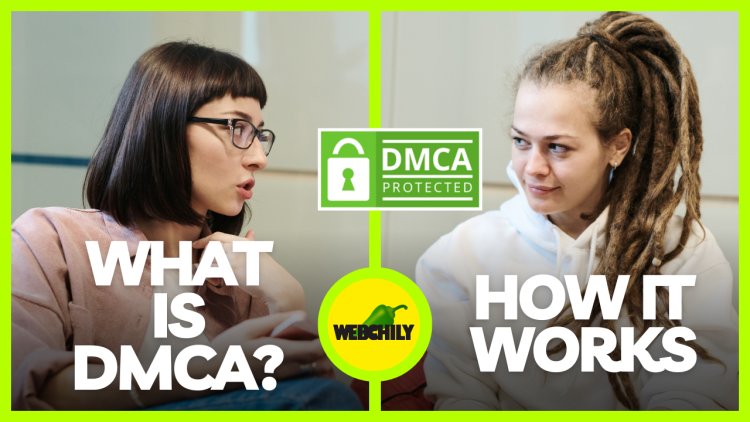What is DMCA? How it works
A DMCA Badge is a seal of protection placed on your website that deters thieves from stealing your content

DMCA stands for Digital Millennium Copyright Act, a United States copyright law that was passed in 1998 to address copyright infringement on the internet. The DMCA provides a legal framework for copyright holders to protect their rights, while also providing a safe harbor for online service providers (OSP) who may host user-generated content.
The DMCA works by giving copyright holders the ability to send a notice to OSPs, requesting that infringing material be removed. The notice, commonly known as a DMCA takedown notice, must include specific information, such as the name and contact information of the copyright holder, a description of the infringing material, and a statement that the copyright holder has a good faith belief that the material is infringing their copyright.
Once the OSP receives a DMCA takedown notice, they are required by law to promptly remove the infringing material, or risk being held liable for the copyright infringement. The OSP may also notify the user who posted the infringing material, and give them an opportunity to respond with a counter-notice, if they believe the material was removed in error.
The DMCA also includes provisions for online service providers to qualify for a safe harbor from liability for infringing activities of their users, as long as they meet certain requirements, such as promptly responding to takedown notices and implementing policies to terminate repeat infringers.
Overall, the DMCA provides a legal framework for copyright holders to protect their rights online, while also balancing the need for online service providers to host user-generated content without facing excessive legal risks.
-
Protection against copyright infringement: By registering for DMCA protection, you can protect your website or online content from copyright infringement by other users or websites. This can help to deter potential infringers from copying or using your content without permission.
-
Legal recourse: If your copyrighted material is being used without permission, you can file a DMCA takedown notice with the OSP hosting the infringing material, and request that it be removed. This can be a powerful tool to protect your intellectual property, as it provides a legal basis for requesting the removal of infringing material.
-
Increased credibility: Displaying DMCA protection badges or seals on your website can help to increase your credibility and reassure visitors that you take copyright protection seriously. This can be particularly important if you are selling products or services online, as it can help to build trust with potential customers.
-
Safe harbor protection: If you are an OSP, registering for DMCA protection can provide you with safe harbor protection from liability for copyright infringement by your users, as long as you meet certain requirements, such as responding promptly to takedown notices.
Overall, DMCA protection can help to protect your intellectual property rights, increase your credibility, and provide legal recourse in case of copyright infringement.
Is DMCA applicable in INDIA?
No, the DMCA (Digital Millennium Copyright Act) is a United States copyright law and is not applicable in India. However, India has its own laws governing copyright and intellectual property, which are similar in many ways to the DMCA.
In India, the relevant legislation is the Copyright Act, 1957, which provides legal protection for copyright owners and regulates the use of copyrighted material. The act provides for civil and criminal penalties for copyright infringement, and includes provisions for takedown notices similar to those provided under the DMCA.
In addition, the Information Technology (Intermediary Guidelines and Digital Media Ethics Code) Rules, 2021, which were recently introduced by the Indian government, provide guidelines for online intermediaries, including OSPs, and set out procedures for the takedown of illegal content.
Therefore, while the DMCA is not applicable in India, copyright owners and OSPs in India have legal options available to them to protect their rights, including under the Copyright Act and the IT Rules.
Here are some steps you can take to implement DMCA protection on your website:
-
Display a DMCA notice on your website: You can display a DMCA notice on your website, which informs users that you take copyright protection seriously and outlines the procedures for filing a DMCA takedown notice.
-
Register your website with the U.S. Copyright Office: Registering your website with the U.S. Copyright Office can provide additional legal benefits and protections, including the ability to seek statutory damages in case of infringement.
-
Respond promptly to DMCA takedown notices: If you receive a DMCA takedown notice, you should respond promptly and remove the infringing material if necessary. Failing to respond to a takedown notice could result in legal liability for copyright infringement.
-
Use a DMCA takedown service: There are also companies that offer DMCA takedown services, which can help to automate the takedown process and provide additional legal protection.
Author is an independent blog writer from Webchily.com, Who creates websites and helps thousands of businesses, Contact us for website designing, digital marketing, and branding. Visit : www.webchily.com or call :+91-9742658000
What's Your Reaction?
















